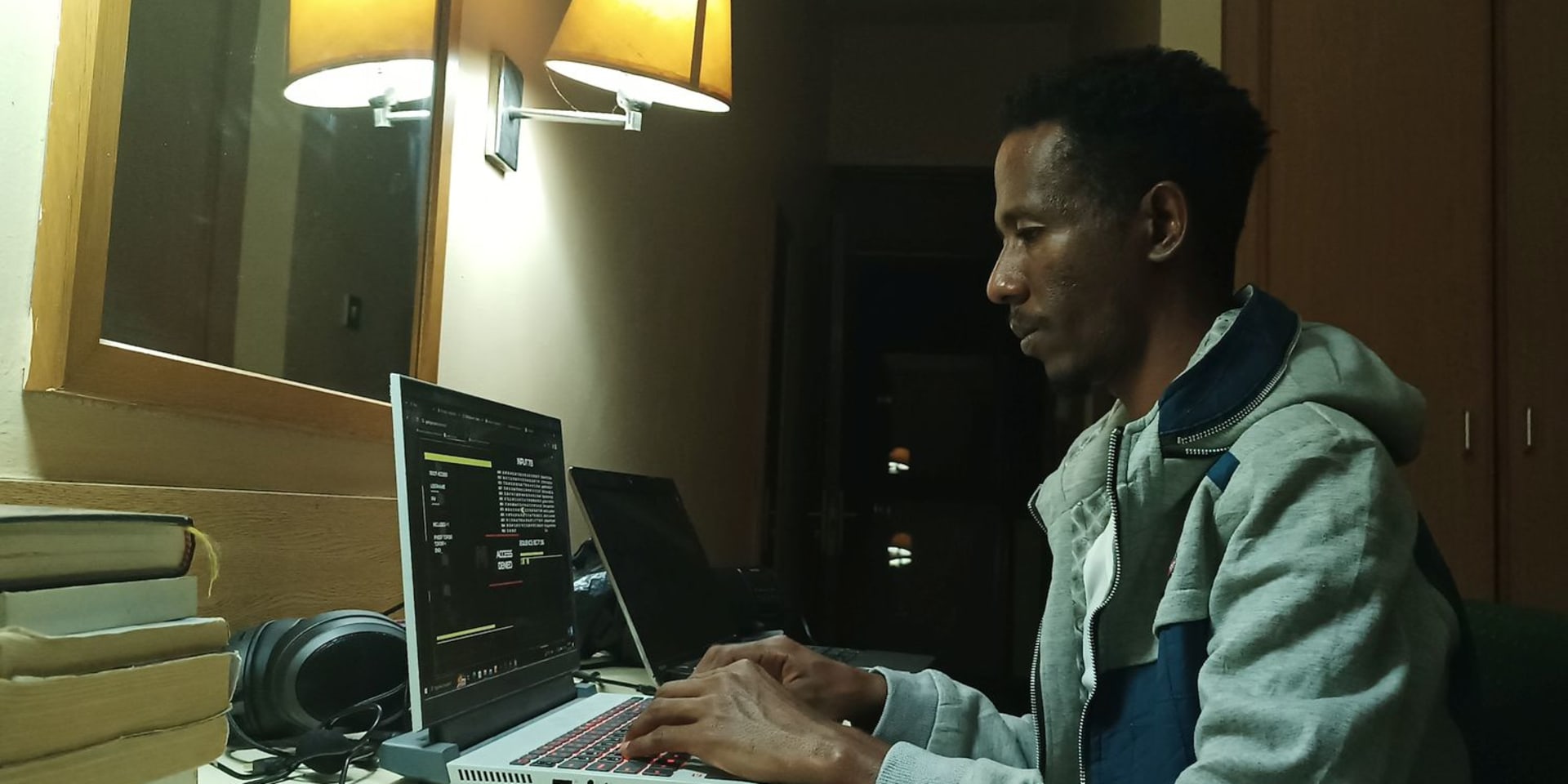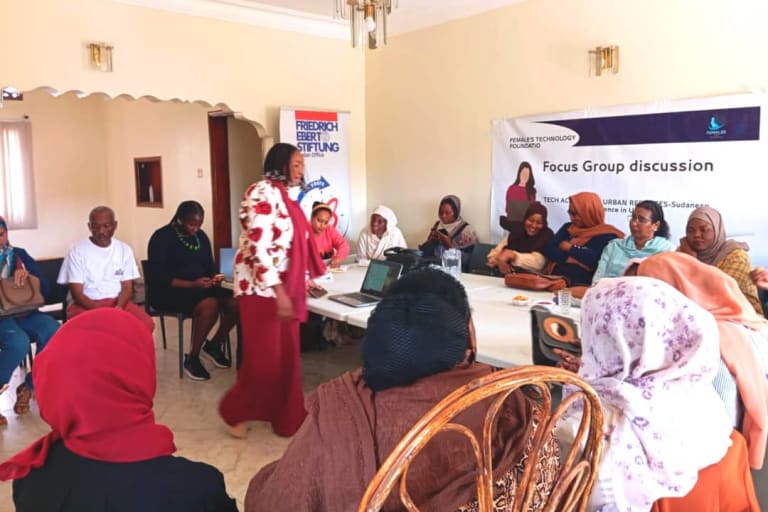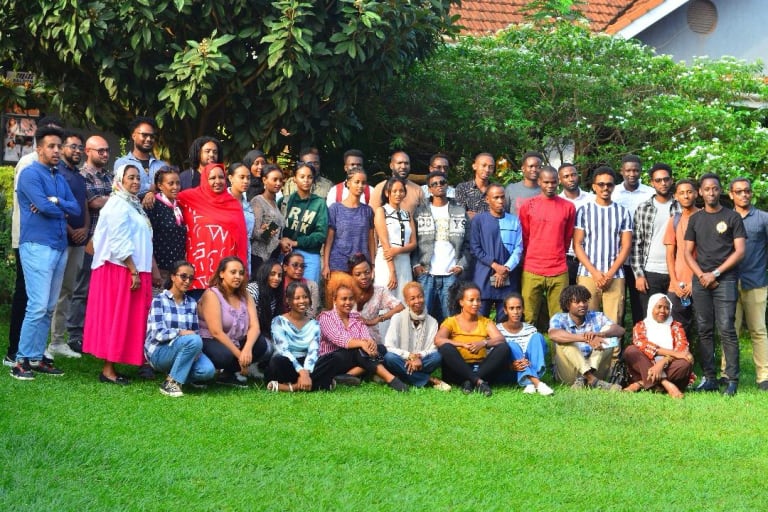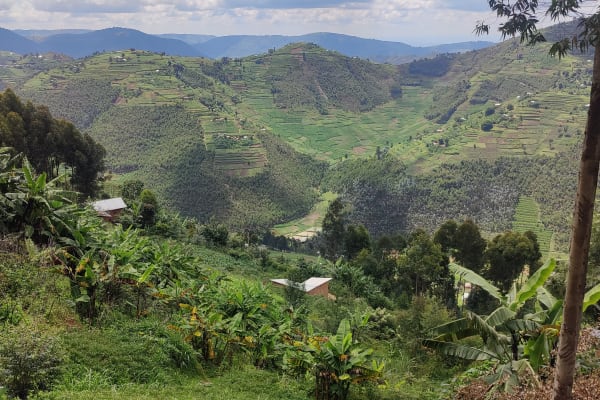‘When I started working there, it was like I could breathe again’
Digital exile: How remote work is reshaping Sudanese lives in diaspora

Al-Gaddal Hassan, een filmmaker die Khartoem ontvluchtte nadat zijn studio was verwoest, coördineert nu digitale filmproducties vanuit Kampala, Oeganda.
© Mohamed Ahmed

Al-Gaddal Hassan, een filmmaker die Khartoem ontvluchtte nadat zijn studio was verwoest, coördineert nu digitale filmproducties vanuit Kampala, Oeganda.
© Mohamed Ahmed
Mohamed Ahmed
09 October 2025 • 24 minutes reading time
Highly educated Sudanese refugees in Uganda are rediscovering their dignity through remote work. They're developing platforms and methods to get their lives and those of others back on track. But this isn't without its challenges. MO* sought out these original thinkers.
In a small rented room in Kampala, surrounded by empty coffee cups and scattered notebooks, Lina Mohamed sits hunched over her laptop, the only possession she carried with her when she fled Sudan, 18 months ago.
The clock approaches midnight, and the intermittent internet connection threatens to derail her deadline for a client in the Gulf. Each time the network drops, she is reminded that this small device is her only lifeline, her window to a world beyond the walls of refugee life.
Mohamed's story is not unique. Since war erupted in Sudan in April 2023, more than 88,000 Sudanese have registered as refugees in Uganda alone, with millions more scattered across East Africa. Among them emerges a growing class of professionals turning to remote work to sustain their lives in exile, earning income and maintaining a sense of identity through online jobs in design, journalism, technology, and mental health.
Unlike previous generations who often relied on aid or informal labor, many of Sudan’s new refugees arrive with university degrees and digital fluency. Aid workers have begun referring to them as a “digital diaspora” – designers, journalists, IT specialists, and therapists who, despite the odds, continue to work online. Yet for all their effort, the job market remains stacked against them. According to United Nations High Commissioner for Refugees (UNHCR), just 29 percent of refugees in Uganda are employed, compared to 64 percent of nationals.
The infrastructure of survival
Before war erupted, Mohamed was building a steady career in El-Obeid, the capital of North Kordofan state, creating marketing materials for regional companies and establishing herself in Sudan's growing design sector.
‘The war stopped everything, and I had to flee after the neighborhood I lived in became a battlefield’, she recounts via a stuttering video call from Kampala.
Her journey to Uganda involved multiple displacements, first to White Nile State, then Port Sudan, each move stripping away more of her professional identity. By the time she crossed into Uganda, Mohamed had joined the ranks of what researchers call the "de-skilled", professionals whose qualifications and experience become suddenly worthless in exile.
Studies show that 85 percent of intermediate-skilled refugees and 79 percent of high-skilled refugees experience professional downgrading upon displacement, often taking jobs several levels below their qualifications just to survive.
The early months in Kampala brought a psychological toll. Mohamed describes waking each day without purpose, trapped in the limbo that affects thousands of educated refugees who cannot access formal employment despite Uganda's progressive policies granting them the right to work.
Only 21 percent of Ugandan employers even know that refugees can legally work, according to a 2019 survey, while those aware often cite concerns about productivity, screening costs, or cultural fit as reasons to avoid hiring refugees.
For all the odds she encountered through her displacement, Mohamed tells Mo* that the experience taught her ‘to do everything possible’ to help herself and her family. It taught her that there are things worth taking risks for and not giving up.
The discovery of freelance platforms marked a turning point. She started with simple projects, basic logos that paid five dollars, business cards for ten, slowly rebuilding not just her portfolio but her sense of professional identity.
‘When I started working on Upwork, I felt like I could breathe again’, she says. ‘Every project I complete reminds me that I am not just a refugee. I am creative, I have value.’
The progression from these small gigs to designing complete marketing campaigns for Gulf clients took months of working through power outages, wrestling with upload speeds that made sending large files an overnight ordeal, and managing client relationships despite payment platforms that do not recognize refugee documentation.
Uganda's internet penetration stands at just 43 percent, with costs consuming a considerable sum of a refugee's monthly income. Mohamed navigates these constraints through adaptation: working at night when connections stabilize, using compression software to reduce file sizes, and maintaining multiple SIM cards from different providers to ensure some form of connectivity.
‘I need a stable connection and a powerful device, but these are luxuries here’, she says. Payment delays create cascading crises that reveal the precariousness of digital survival.
But when a client in Dubai takes six weeks to process payment, Mohamed cannot simply wait it out. Rent comes due, food must be purchased, and internet packages expire.
Networks of resistance
Mohamed's individual success has evolved into collective action. Recognizing that other refugee women faced similar barriers, often compounded by childcare responsibilities, cultural restrictions on women's work, and even less access to technology, she began organizing informal training sessions in borrowed spaces across Kampala.
‘Training women in digital marketing gives them autonomy’, Mohamed explains while scrolling through photos from recent workshops. These sessions operate on ingenuity rather than infrastructure. Participants share devices, with three or four women clustered around a single laptop.
‘I don’t just teach design’, Mohamed said. ‘I show them how to survive as digital workers…how to explain work gaps without saying they’re refugees, which payment apps work without a bank account, how to price their services when one lost client could mean no food that week.’
Every project I complete reminds me that I am a professional, not just a refugee feeling lostYusra El-Nil, soedanese vrouwenrechtenactiviste
Research indicates that refugee women who gain economic independence report improved mental health, greater decision-making power within families, and increased investment in children's education.
One participant leveraged Mohamed's training to launch a catering service marketed through Facebook.
‘Seeing a woman take control of her future through her phone is inspiring, Within three months, her earnings covered her children's school fees’, Mohamed recounts. ‘I want a platform that provides training and job opportunities for women in Kampala and beyond. If we get advanced courses, we can compete in the global market.’
The technology underground
Yusra El-Nil operates what she calls a ‘digital resistance center’ from a converted apartment, having transformed her own escape into a pathway for others. El-Nil fled El-Obeid after her work as a women's rights activist made her a target, arriving in Kampala with technical skills but no way to use them within traditional employment structures.
‘I was stuck in emptiness, as if I was waiting for something that would never come’, she recalls of her first months in Kampala. ‘The financial pressures, legal restrictions, and social tensions among Sudanese refugees themselves created a suffocating environment.’

Women participate in a training session hosted by the Foundation for Technology and Women (FTF) in Kampala, where Yusra El-Nil teaches digital skills and online safety to Sudanese refugee women seeking remote work.
© FTF
The Foundation for Technology and Women (FTF), established by El-Nil, functions with no formal recognition or steady funding, but it has become an informal lifeline for refugee women navigating both displacement and digital work. The curriculum addresses the specific challenges they face, from digital security to avoid harassment that trails them online, to encrypted communication for staying in touch with family, to navigating male-dominated tech spaces in both Sudanese and Ugandan contexts.
‘When I started working on Upwork, I felt like I could breathe again’, El-Nil said. That sense of relief, she added, is what she now hopes to pass on to others.
Political divisions from Sudan recreate themselves in digital spaces, with refugees facing harassment and threats for their perceived affiliations. El-Nil herself has received death threats via Facebook for her calls to end the war.
‘The transfer of hatred and polarization from Sudan to the diaspora is not new, but it has worsened after the war’, she observes. Rather than retreating, she has integrated digital self-defense into FTF's training.
‘We use Facebook to spread messages of peace, because it is the most used platform among refugees’, she explains.
The organization's impact extends beyond its 130 direct trainees. FTF has created a model for refugee-led empowerment that challenges traditional aid paradigms.
‘Every project I complete reminds me that I am a professional, not just a refugee feeling lost’, El-Nil affirms. ‘Remote work is not a solution to all problems, but it is an important alternative door, especially for girls.’
Truth in exile
The digital resistance takes its most dangerous form in journalism. Murtada Ahmed coordinates an underground network of reporters documenting war crimes from Sudan.
After four arrests and escalating death threats forced him from Omdurman, Ahmed co-founded Droub, an independent platform that has become one of the few reliable sources for information from Sudan's conflict zones.
According to Ahmed, Droub operates like ‘a digital-age resistance newspaper.’ Contributors coordinate through encrypted channels, using Telegram for daily operations and Signal for sensitive sources.
‘It is a free space. We pay from our own time because we believe in the message’, he tells MO*.
‘We are keeping the truth alive, but the psychological cost of this achievement weighs heavily on the team’Murtada Ahmed, mede-oprichter ‘Droub’
The technical infrastructure required to maintain operational security while publishing regularly would challenge established media organizations. For refugee journalists operating on minimal budgets with constant surveillance threats, it requires extraordinary innovation.
‘Expensive internet and power outages make communication with sources in Sudan almost impossible’, Ahmed says. ‘Internet costs consume most of our minimal budget, what might be a minor expense for Western media organizations can mean choosing between connectivity and food.’
Power outages destroy hours of work when unsaved documents vanish. Sources inside Sudan risk their lives to transmit information, only for connections to fail at crucial moments. Ahmed describes spending entire nights attempting to upload video evidence of atrocities, watching progress bars inch forward only to reset when connections drop.
Despite these constraints, Droub has published over 200 investigative pieces since its founding. International human rights organizations cite their documentation regularly. Prosecutors building war crimes cases rely on their evidence. They have created an archive of accountability that would not exist without their work.
‘We are keeping the truth alive’, Ahmed says. ‘The psychological cost of this achievement weighs heavily on the team. Processing testimonies of violence, viewing footage of atrocities, maintaining professional distance while documenting the destruction of the homeland – the toll accumulates daily.’
Ahmed's vision extends beyond documentation. He plans an English-language section to reach global audiences and a secure submission system enabling citizens to report directly from conflict zones.
‘If we have stable internet and funding, we can change the way crises are covered’, he affirms. ‘I want Droub to be a voice for everyone who is not heard.’
Financial sovereignty through code
Mohamed Akasha, an engineering manager who fled Khartoum's collapsed business environment, now teaches refugees to use cryptocurrency as an alternative to failed banking systems. His organization, Btchubafrica, has trained over 200 young Sudanese and Eritrean refugees in blockchain basics, creating what he calls ‘financial sovereignty for the stateless.’
‘Our goal is to create a decentralized financial system that transcends bank restrictions’, he tells MO*.
According to Akasha, Traditional banking systems require documentation that refugees lack. Remittance services charge fees that can reach 20 percent of transfers. Government controls and sanctions make moving money across borders increasingly difficult. For Sudanese refugees watching their country's currency collapse, cryptocurrency offers æstability unavailable through traditional channels.’
‘Bitcoin gives you control away from inflation’, he explains. ‘In war, you lose control over everything…your home, your work, your security, but Bitcoin gives you something no one can take from you – your financial freedom.’

The Foundation for Technology and Women (FTF) is partnering with Btchubafrica in Kampala to teach refugee women both digital skills and the basics of cryptocurrency.
© FTF
Yet adoption faces significant barriers.
‘Many people think Bitcoin is linked to crime or that it is a scam’, he acknowledges. ‘This makes it difficult to convince people to use it.’
Sophisticated scams specifically target desperate refugees, with fraudsters posing as aid organizations or employment agencies. The technical knowledge required to safely navigate cryptocurrency markets remains out of reach for many.
Akasha spends as much time on risk education as technical training, teaching refugees to recognize common scams, secure digital wallets, and convert between digital and local currencies without exposing themselves to fraud or theft.
‘We explain to them that blockchain is transparent technology, but they must be careful of scams’, he clarifies.
Akasha envisions cryptocurrency enabling new forms of economic organization for displaced populations. Refugees could receive direct payments for digital work without bank accounts. Diaspora communities could support those in camps without paying remittance fees. Smart contracts could enable transparent aid distribution, reducing corruption that diverts resources from intended recipients.
‘If we can build a network of trained users, we can create a parallel digital economy that supports fragile communities’, Akasha says. ‘We hope to integrate them into educational and banking systems.’
Regulatory uncertainty makes many organizations hesitant to engage. The volatility of cryptocurrency markets poses risks for populations that cannot afford losses. The energy requirements of blockchain technology seem incongruous with the basic infrastructure challenges refugees face daily.
Despite these constraints, Akasha continues building what he sees as essential infrastructure for stateless populations.
Creative production in displacement
Digital tools have also transformed creative industries for refugees. Al-Gaddal Hassan, whose Khartoum studio was destroyed in the war's early days, has rebuilt his filmmaking practice entirely online. Working with team members scattered across four countries, he coordinates productions that would have seemed impossible before digital collaboration tools became ubiquitous.
‘I was living my dream of telling people's stories through my lens’, Hassan tells MO*. ‘But the war took everything.’
In Kampala, Hassan found salvation in remote collaboration, describing how himself and other team members now meet via Zoom and coordinate through Slack. The technical constraints also force constant innovation. Professional cameras gave way to smartphones. Expensive editing suites were replaced by open-source software.
‘Every project reminds me I am still a storyteller’, Hassan says. ‘Every project I complete reminds me that I am still creative.’
Yet sustainability remains precarious. The constant payment delays keep him in ‘constant anxiety’ as he waits for months to receive his money. Additionally, slow internet turns simple file uploads into all-night ordeals that delay project completion and damage professional relationships.
‘Uploading a video can take hours’, he says with frustration. ‘The absence of professional equipment limits the projects I can bid for.’ While the unpredictability of freelance schedules affects his personal life, making him feel as if he lives inside his screen.
‘We learned how to think of alternatives in war onditions’, Hassan tells MO*.
He envisions a digital production hub that would formalize these informal collaborations – shared equipment libraries accessible to refugee creators, training programs in digital production techniques, and distribution partnerships with international platforms.
‘If you give us the tools, we can tell our stories to the world’, he says enthusiastically.
Similarly, Maher Gouda has transformed his logistics expertise into digital coordination work. The 32-year-old refugee, who now moves between Addis Ababa and Kampala, works remotely for a virtual travel agency after fleeing Khartoum in July 2023.
‘I left everything behind – my home, my work, my dreams’, Gouda tells MO*.
Using WhatsApp and electronic payment platforms like Payoneer, Gouda has coordinated services for over 8,000 cases, mostly young families and displaced women seeking shelter and employment opportunities. The work provides both income and purpose, connecting refugees with essential services during emergencies.
‘Sometimes I wait hours to get stable internet’, Gouda says. ‘Banking restrictions also complicate money transfers, and the uncertainty of refugee status procedures deepens the psychological toll.’
Despite these challenges, Gouda sees potential in digital solutions.
‘The internet made me feel I can make a difference’, he says. ‘We need better internet and training in digital skills to empower more refugees.’
Mental health across screens
The digital transformation extends to essential services typically requiring physical presence. Mona Al-Amin, a psychiatrist who fled Khartoum when the war made her work impossible, now provides mental health support entirely through digital platforms. Operating free virtual clinics via WhatsApp and Zoom, she serves refugee communities across East Africa who would otherwise have no access to mental health care.
‘I felt like I was losing my identity as a doctor’, Al-Amin tells MO*. ‘Online allows me to reach patients in remote areas and reduces expensive travel costs.’
Through her virtual sessions, Al-Amin follows up on cases of anxiety and post-traumatic stress disorder, with women and children forming the majority of her patients. ‘People have lost their homes and their sense of security. I try to restore hope to them.’
In refugee settings, the challenges of digital psychiatry often outpace those in more stable environments. Al-Amin frequently contends with weak networks that cut therapy sessions short, sometimes mid-conversation. Privacy is another obstacle. Many clients rely on shared or outdated devices, making it difficult to speak openly during sessions and limiting the depth of care she can provide. Medical limitations prove equally challenging.
‘We lack analyses and examinations, and this makes the diagnosis incomplete’, she explains. ‘Complex conditions requiring physical examination or hospitalization remain beyond reach.’
Medication access poses yet another barrier. Al-Amin often finds that prescriptions go unfilled, either because the drugs are unavailable locally or because patients simply cannot afford them, rendering treatment plans ineffective before they begin.
Despite limitations, demand overwhelms capacity. Al-Amin sees 40-50 patients weekly, with waiting lists extending months. The conditions she treats, PTSD, depression, anxiety, affect enormous percentages of refugee populations but receive minimal attention in traditional humanitarian responses.
‘We try to bridge the gap, but the challenges come from lack of resources’, she says.‘It is not the best solution, but it ensures continuity of care’, Al-Amin affirms.
Research indicates that refugees receiving mental health support show improved physical health outcomes, greater economic productivity, and better family functioning. Yet mental health remains dramatically underfunded in humanitarian responses, receiving less than one percent of health budgets despite affecting majority of refugee populations.
‘If the internet is strong and devices are available, we can save more lives’, Al-Amin insists, emphasizing that online psychological support restores patients' sense of control in a turbulent world.
Psychologist Haifa Hamad sees remote work as a vital coping mechanism. For many refugees, it restores a sense of control. But while digital work reflects the community’s resilience, she cautions that it is no substitute for systemic support. Infrastructure gaps and limited access to equipment still undermine its potential.
Lasting change, she argues, requires more than connectivity. Legal frameworks must evolve to recognize digital labor as legitimate employment. Financial systems need to accommodate those without formal documentation. Education should focus on preparing displaced people for digital economies rather than traditional jobs that may never return. And social protection systems must expand to cover workers operating outside conventional employment.
‘We are not just refugees. We are professionals, we are creators, we are builders of something new’, Mohamed insists as the final video call draws to a close, the connection flickering but holding. ‘The war took our country, but it cannot take our skills, our creativity, our determination to build again’.
This article is published in collaboration with Egab
If you are proMO*...
Most of our work is published in Dutch, as a proMO* you will receive mainly Dutch content. That said we are constantly working to improve our translated work. You are always welcome to support us both as a proMO* or by supporting us with a donation. Want to know more? Contact us at promo@mo.be.
You help us grow and ensure that we can spread all our stories for free. You receive MO*Magazine and extra editions four times a year.
You are welcome at our events free of charge and have a chance to win free tickets for concerts, films, festivals and exhibitions.
You can enter into a dialogue with our journalists via a separate Facebook group.
Every month you receive a newsletter with a look behind the scenes.
You follow the authors and topics that interest you and you can keep the best articles for later.
Per month
€4,60
Pay monthly through domiciliation.
Meest gekozen
Per year
€60
Pay annually through domiciliation.
For a year
€65
Pay for one year.
Are you already proMO*
Then log in here